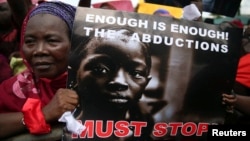YAOUNDE, CAMEROON —
As global concern builds over the fate of hundreds of Nigerian girls kidnapped by Boko Haram terrorists three weeks ago, Cameroon is denying allegations that some of the girls have been taken into the country to be sold.
Cameroon Minister of Communication Issa Tchiroma Bakari told VOA he is shocked by the speculation that some of the missing girls may be being held in the country.
"We insist that allegations from Nigeria that a part of the 200 young female students recently kidnapped in the northeast of Nigeria would have been transferred to Cameroon to be forced into marriage to members of the Boko Haram sect are fully unfounded. Cameroon will never ever serve as a support base for destabilization activities towards other countries," said Bakari.
Bakari said this is not the first time Cameroon has been dragged into what he called the “unfortunate and heinous” crimes taking place in Nigeria. But, he repeated, his country is committed to combating terrorism with Nigerian authorities and all regional partners.
"Cameroon is subject to attacks perpetrated from neighboring countries and by nationals of those countries. I will like to recall our entire willingness and readiness to cooperate in good faith with the governments of neighboring countries to fight against trans-border criminality in respect of the territorial integrity and sovereignty of each country," said Bakari.
Boko Haram admits taking girls
On Monday the Islamist militant sect Boko Haram claimed responsibility for taking hundreds of girls from their school in Chibok, Borno state, near the Cameroon border on April 14th. Some of the girls were able to escape, but 276 are still missing.
In a Hausa language video sent to news agencies, Boko Haram leader Abubakar Shekau promised to “sell them to the marketplace” as slave wives. Unconfirmed reports have said that some of the girls had been married to their Boko Haram captors, while others speculated they had been moved across the border into Chad and Cameroon.
Violence attributed to Boko Haram in northern Nigeria has spilled over into Cameroon during the past year. There have been gunfights in villages, kidnappings and arms trafficking arrests.
In the latest incident, suspected Boko Haram members attacked a Cameroon army post in Kousseri on the border with Borno State - Boko Haram’s headquarters - and freed one of its leaders caught trafficking arms. Cameroon officials say two people died in the attack.
On Monday, White House spokesman Jay Carney said the United States will give Nigeria counterterrorism assistance to help in the search for the missing girls, with a focus on information sharing.
Cameroon Minister of Communication Issa Tchiroma Bakari told VOA he is shocked by the speculation that some of the missing girls may be being held in the country.
"We insist that allegations from Nigeria that a part of the 200 young female students recently kidnapped in the northeast of Nigeria would have been transferred to Cameroon to be forced into marriage to members of the Boko Haram sect are fully unfounded. Cameroon will never ever serve as a support base for destabilization activities towards other countries," said Bakari.
Bakari said this is not the first time Cameroon has been dragged into what he called the “unfortunate and heinous” crimes taking place in Nigeria. But, he repeated, his country is committed to combating terrorism with Nigerian authorities and all regional partners.
"Cameroon is subject to attacks perpetrated from neighboring countries and by nationals of those countries. I will like to recall our entire willingness and readiness to cooperate in good faith with the governments of neighboring countries to fight against trans-border criminality in respect of the territorial integrity and sovereignty of each country," said Bakari.
Boko Haram admits taking girls
On Monday the Islamist militant sect Boko Haram claimed responsibility for taking hundreds of girls from their school in Chibok, Borno state, near the Cameroon border on April 14th. Some of the girls were able to escape, but 276 are still missing.
In a Hausa language video sent to news agencies, Boko Haram leader Abubakar Shekau promised to “sell them to the marketplace” as slave wives. Unconfirmed reports have said that some of the girls had been married to their Boko Haram captors, while others speculated they had been moved across the border into Chad and Cameroon.
Violence attributed to Boko Haram in northern Nigeria has spilled over into Cameroon during the past year. There have been gunfights in villages, kidnappings and arms trafficking arrests.
In the latest incident, suspected Boko Haram members attacked a Cameroon army post in Kousseri on the border with Borno State - Boko Haram’s headquarters - and freed one of its leaders caught trafficking arms. Cameroon officials say two people died in the attack.
On Monday, White House spokesman Jay Carney said the United States will give Nigeria counterterrorism assistance to help in the search for the missing girls, with a focus on information sharing.










